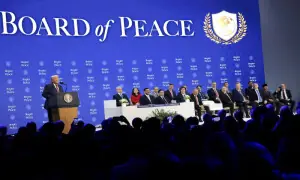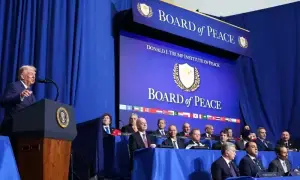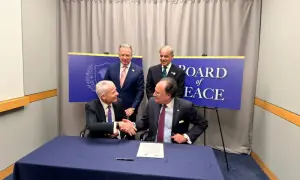Pakistan optimistic on trade with India: Hafeez
2 min read WASHINGTON: Pakistan's finance minister on Wednesday voiced optimism about trade with India, saying that he saw popular support for building ties with the historic foe and benefiting from its "dynamic" economy.
WASHINGTON: Pakistan's finance minister on Wednesday voiced optimism about trade with India, saying that he saw popular support for building ties with the historic foe and benefiting from its "dynamic" economy.
India and Pakistan, which have fought three full-fledged wars since independence in 1947, recently approved a most-favored nation accord to reduce taxes that hamper trade. Official trade is heavily tilted in India's favor.
"There was a time when I used to evaluate Pakistan and I thought the best way for it to really develop is to relocate. I used to think that the best place for us to take Pakistan would be somewhere between Italy and Switzerland," Finance Minister Abdul Hafeez Shaikh said in jest.
"Now I've changed my mind because the parts that I thought we should be located in (Europe) aren't doing that great in terms of growth and where we are is the most dynamic part of the world," he said.
"So I think we should stay there, we should work and be good neighbors with each other," Shaikh, who was visiting Washington for the annual World Bank/IMF spring meetings, said at the Brookings Institution think-tank.
The South Asian Association for Regional Cooperation, an eight-nation bloc, has repeatedly pledged to boost economic ties but such promises have made little headway amid the constant friction between India and Pakistan.
But Shaikh said that the new trade initiative enjoyed firm support of both business and political leaders.
"It reflects considerable thinking and it shows the economic merit that's there," he said.
"So I personally feel quite optimistic that this is an area where the payoffs are there."
Pakistan has faced persistent economic concerns amid a shaky supply of electricity, a weak revenue base, high external debt and security concerns that have scared off some foreign investors.
Shaikh, however, painted an upbeat picture and said that Pakistan's economy would grow this year at 4.0 percent -- above IMF forecasts and well up from 2.4 percent last year -- due to solid crop yields and a rebound in manufacturing. AFP




















Comments are closed on this story.